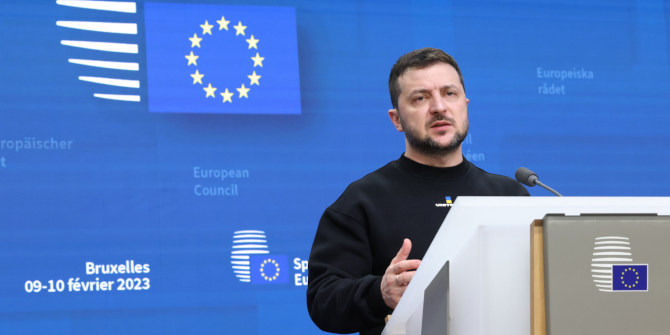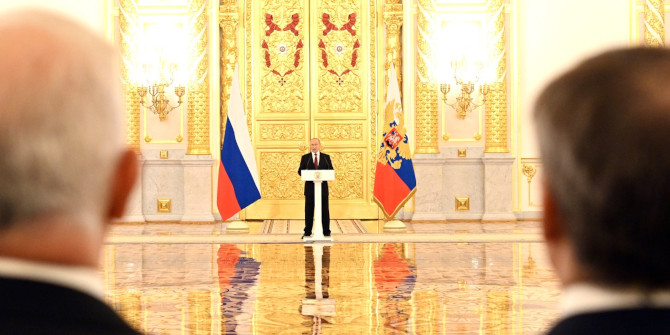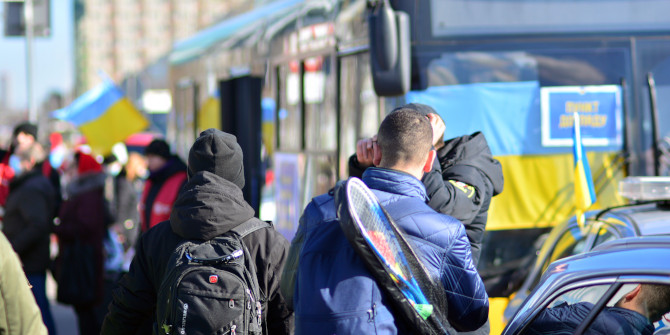The EU implemented a united and strong response to Russia’s invasion of Ukraine in 2022 and has now approved thirteen packages of sanctions against Russia over the conflict. However, as Karen E. Smith writes, it is the decision to offer Ukraine a path to EU membership that is likely to have the biggest long-term impact on European security.
Russia’s invasion of Ukraine is the gravest security and economic threat that the European Union faces, and countering that threat must be the EU’s foremost strategic goal. Russian President Vladimir Putin has repeatedly called into question Ukraine’s existence as an independent sovereign state, which means that it is highly unlikely that a ceasefire agreement would prevent Russia from renewing its aggression against Ukraine in future.
There are fears that Russia could also use violence against the Baltic states, and it has threatened to use nuclear force against NATO states supporting Ukraine. In response, the EU has repeatedly stated that Ukraine must regain territory lost to Russia and be integrated into the European Union. However, it is not evident all of the EU member states are fully on board, nor that sufficient resources been marshalled to try to achieve this goal.
The EU’s response to Russia’s 2022 invasion has been impressively united and robust, and with its decision to open membership negotiations with Ukraine and Moldova, the EU has taken decisions that are profoundly transformative for the European order. The EU has taken action to punish Russia for its violation of international security norms on the non-use of force, and to support Ukraine.
Sanctions
The actions taken to punish Russia have been surprisingly strong, given the costs they have entailed for EU member states, while the policies to support Ukraine have been strikingly generous. The shock of the invasion enabled member states to overcome the divisions between those that sought to engage with Russia, such as France and Germany, and those that advocated a more robust approach, including the three Baltic states. Yet cracks in the EU’s unity have since appeared and have been difficult to paper over.
As of late April 2024, the EU has approved thirteen sanctions packages on Russia. These have targeted hundreds of individuals and entities with visa bans and asset freezes; Russia’s access to capital and financial markets has been restricted; and transport links have been blocked. The EU has banned exports of military equipment to Russia and has blocked the import from Russia of goods of importance to the Russian economy including oil, coal, steel, gold and diamonds.
Over €300 billion of Russian central bank reserves have been frozen, mostly in the EU, with discussions ongoing about using the interest earned on those reserves to help finance Ukraine’s reconstruction. EU member states also agreed to reduce their demand for Russian gas, though only on a voluntary basis, and the EU has significantly diversified away from Russian gas, with dependence on Russian imports falling by about two-thirds in 2023.
Some exceptions to sanctions have been carved out for a few member states, but by and large support for strengthening the sanctions regime remains strong. A troubling issue is that some prospective EU membership candidates – Georgia, Serbia and Turkey – have not implemented EU sanctions, signalling that their acceptance of the EU’s “acquis politique” is incomplete.
Support for Ukraine
Diplomatic support for Ukraine has been strong, and in October 2023, the EU’s Foreign Affairs Council even held an extraordinary meeting in Kyiv – the first time it had ever met outside of the EU. The EU has been generous towards refugees fleeing the war in Ukraine. It suspended all customs duties on imports from Ukraine. And since February 2022, according to the Kiel Ukraine Support Tracker, the EU and its member states have committed substantial sums to Ukraine, over €140 billion, in the form of macro-financial aid, humanitarian aid, budget support and military aid.
But there is considerable variation in the support given by member states, with northern member states giving considerably more in volume and/or as a percentage of GDP than southern member states and France. And some measures to support Ukraine, such as easing restrictions on its grain exports, have been opposed by Bulgaria, Hungary, Poland, Romania and Slovakia. The EU also could not keep a promise to provide 1 million rounds of ammunition by March 2024.
However, by far the most important decision that the EU has taken vis-à-vis Ukraine is the support for its eventual EU membership. Only days after Russia’s full-scale invasion, Ukraine applied to join the EU. By December 2023, the “enlargement project” had been revived after several moribund years, with the European Council agreeing to open negotiations with Ukraine and Moldova – despite Hungary’s declared opposition to the move.
The membership promise is the most far-reaching, “geopolitical” and strategic of all the EU’s responses to Russia’s invasion of Ukraine. It is through the enlargement process that the EU will shape the future European order in ways that solidify the importance of the EU as the cornerstone of cooperation within Europe. Securing Ukraine as a democratic, economically resilient member of the EU will be transformative for European security. The enlargement prospect goes well beyond the other measures that the EU has taken to support Ukraine, not least because it signals a long-term, permanent commitment to the country.
An emerging strategy
Although the EU has many “strategies” (the EU-Indo-Pacific strategy; the Global Strategy for the EU’s Foreign and Security Policy; a Comprehensive Strategy with Africa; and so on), strategising tends to be quite challenging in the EU, with the twenty-seven member states and EU institutions struggling to agree on priorities and a vision. The promise of enlargement to Ukraine is, however, an example of a putative strategy, in that it is a clear – albeit very long-term – goal, commensurate with the challenge of supporting Ukraine’s sovereignty and independence, and countering Russian aggression.
But to maintain the credibility of the enlargement project, the EU and its member states must follow through, which means trying to ensure that Ukraine regains control of its territory. This is clearly a monumental challenge, but they must quell doubts about the EU’s strategic capacity if they wish to avoid having to face the question of “who lost Ukraine”.
For more information, see the author’s accompanying paper in Current History
Note: This article gives the views of the author, not the position of EUROPP – European Politics and Policy or the London School of Economics. Featured image credit: European Union





